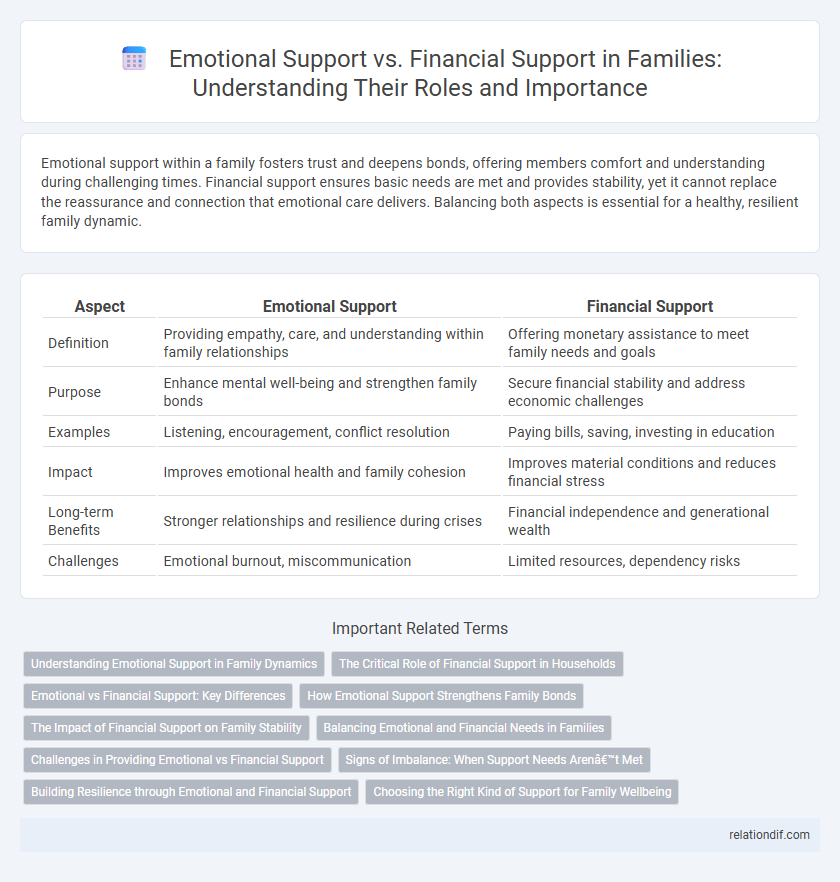Emotional support within a family fosters trust and deepens bonds, offering members comfort and understanding during challenging times. Financial support ensures basic needs are met and provides stability, yet it cannot replace the reassurance and connection that emotional care delivers. Balancing both aspects is essential for a healthy, resilient family dynamic.
Table of Comparison
| Aspect | Emotional Support | Financial Support |
|---|---|---|
| Definition | Providing empathy, care, and understanding within family relationships | Offering monetary assistance to meet family needs and goals |
| Purpose | Enhance mental well-being and strengthen family bonds | Secure financial stability and address economic challenges |
| Examples | Listening, encouragement, conflict resolution | Paying bills, saving, investing in education |
| Impact | Improves emotional health and family cohesion | Improves material conditions and reduces financial stress |
| Long-term Benefits | Stronger relationships and resilience during crises | Financial independence and generational wealth |
| Challenges | Emotional burnout, miscommunication | Limited resources, dependency risks |
Understanding Emotional Support in Family Dynamics
Emotional support in family dynamics fosters trust, resilience, and open communication, essential for healthy relationships and individual well-being. Unlike financial support, emotional support addresses psychological needs, providing comfort during stress, validation of feelings, and encouragement that strengthens familial bonds. Understanding the pivotal role of empathy and active listening enhances emotional connections and promotes harmonious interactions within the family unit.
The Critical Role of Financial Support in Households
Financial support plays a critical role in maintaining household stability by ensuring access to basic needs such as housing, food, and healthcare. While emotional support nurtures mental and relational well-being, financial resources provide the foundation that allows families to thrive and reduce stress related to economic uncertainty. Effective management of financial support contributes to long-term security and overall family resilience.
Emotional vs Financial Support: Key Differences
Emotional support in families involves empathy, active listening, and encouragement, fostering psychological well-being and strengthening relationships. Financial support, on the other hand, addresses material needs such as housing, education, and healthcare, ensuring stability and security. The key difference lies in emotional support nurturing mental health, while financial support provides tangible resources essential for daily living.
How Emotional Support Strengthens Family Bonds
Emotional support nurtures trust and open communication within families, creating a safe environment for members to express feelings and resolve conflicts effectively. This psychological connection fosters resilience, enabling family members to navigate challenges collaboratively and strengthening their long-term relationships. Unlike financial support, emotional support builds a foundation of empathy and understanding that sustains family unity beyond material assistance.
The Impact of Financial Support on Family Stability
Financial support significantly enhances family stability by reducing stress related to basic needs such as housing, food, and healthcare. Consistent monetary assistance strengthens emotional bonds by enabling parents to focus on nurturing relationships rather than economic survival. Access to financial resources directly correlates with improved mental health and overall family well-being.
Balancing Emotional and Financial Needs in Families
Balancing emotional and financial needs in families requires recognizing that emotional support fosters trust, communication, and resilience, while financial support ensures stability and security. Families that integrate both forms of support create an environment where members feel valued emotionally and protected materially, enhancing overall well-being. Prioritizing open dialogue about financial challenges alongside expressions of empathy cultivates a harmonious family dynamic essential for long-term strength.
Challenges in Providing Emotional vs Financial Support
Providing emotional support within families often demands sustained empathy, active listening, and patience, which can be exhausting and difficult to measure or quantify. Financial support, while more straightforward to offer through tangible resources, poses challenges related to budgeting constraints, potential dependency, and managing expectations. Balancing both types of support requires recognizing their distinct emotional labor and economic impacts on family dynamics.
Signs of Imbalance: When Support Needs Aren’t Met
Signs of imbalance in family support often include increased conflicts, feelings of neglect, and emotional withdrawal when emotional needs go unmet despite financial stability. Conversely, when emotional support is abundant but financial assistance is lacking, stress and anxiety over basic needs and security can strain relationships. Recognizing these signs early helps families address gaps and foster both emotional connection and financial reliability.
Building Resilience through Emotional and Financial Support
Building resilience in family dynamics involves a balanced combination of emotional support and financial stability, where emotional support fosters trust and open communication, enhancing coping mechanisms during stressful times. Financial support provides security and reduces anxiety related to basic needs, enabling family members to focus on personal growth and collective problem-solving. Integrating both forms of support strengthens family bonds, promoting long-term adaptability and overall well-being.
Choosing the Right Kind of Support for Family Wellbeing
Emotional support fosters mental health and strengthens family bonds by enhancing communication and trust among members. Financial support ensures basic needs are met, reducing stress related to housing, food, and education. Evaluating the family's immediate needs and long-term goals enables effective balancing of emotional and financial resources for overall wellbeing.
Emotional support vs Financial support Infographic

 relationdif.com
relationdif.com